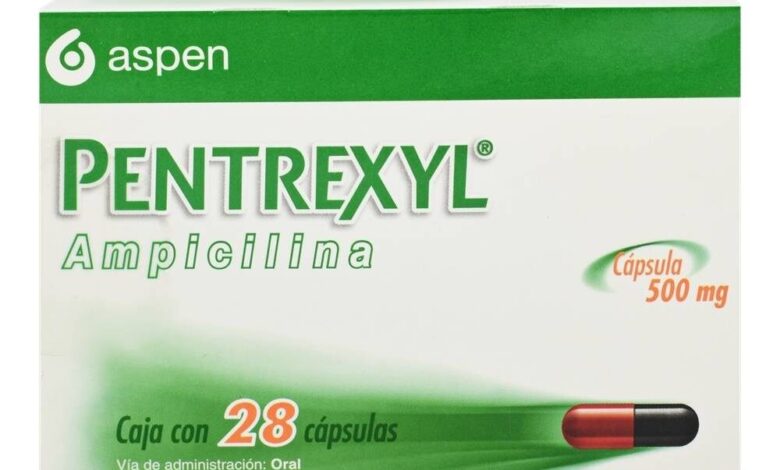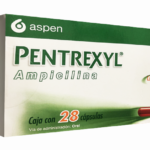How Do You Take Pentrexyl 500mg?

Pentrexyl is a brand of ampicillin in Mexico, Ecuador, Kuwait, Lebanon , Serbia and several other countries. Pentrexyl ampicillin is an antibiotic used to prevent and treat a number of bacterial infections, such as respiratory tract infections, urinary tract infections, meningitis, salmonellosis, and endocarditis. It may also be used to prevent group B streptococcal infection in newborns.
Pentrexyl belongs to the drug class penicillins. A class of drugs is a group of medications that work in a similar way. These drugs are often used to treat similar conditions. It works by killing bacteria to stop the infection from growing in your body. Pentrexyl oral capsule is a prescription drug, it also comes as an oral suspension and in an intravenous (IV) form, which is only given by a healthcare provider.
How Do You Take Pentrexyl 500mg?
The usual oral dose of Pentrexyl 500mg for most infections is 500 mg 4 times daily for 7-14 days. Food in the stomach reduces how much and how quickly ampicillin is absorbed. Therefore, Pentrexyl 500mg should be taken either 1 hour prior to or 2 hours following a meal for maximal absorption; however, for persons who experience nausea or stomach distress after taking Pentrexyl 500mg, it may be taken with meals.
Is Pentrexyl 500mg safe to use during pregnancy or while breastfeeding?
Pentrexyl 500mg is considered safe during pregnancy. Ampicillin is excreted in breast milk and may cause diarrhea or allergic responses in nursing infants. If Pentrexyl 500mg is used during pregnancy, the potential benefit of Pentrexyl for the mother should be weighed against the potential risk of side effects in the infant. Ampicillin is used for treating infants.
Which drugs or supplements interact with Pentrexyl 500mg?
Pentrexyl oral capsule can interact with other medications, vitamins, or herbs you may be taking. An interaction is when a substance changes the way a drug works. This can be harmful or prevent the drug from working well.
To help avoid interactions, your doctor should manage all of your medications carefully. Be sure to tell your doctor about all medications, vitamins, or herbs you’re taking. To find out how this drug might interact with something else you’re taking, talk to your doctor or pharmacist.
Examples of drugs that can cause interactions with Pentrexyl oral capsule are listed below.
Interactions that increase your risk of side effects
Increased side effects from Pentrexyl: Taking Pentrexyl with certain medications raises your risk of side effects from Pentrexyl. This is because the amount of Pentrexyl in your body may be increased. Examples of these drugs include:
- Probenecid
- Taking this drug with Pentrexyl can cause more side effects. These can include severe nausea, vomiting, and diarrhea.
- Allopurinol
- This drug increases the risk of skin rash when you take it with Pentrexyl.
Interactions that can make your drugs less effective
When Pentrexyl is less effective: When you take Pentrexyl with certain antibiotics, it may not work as well to treat your condition. This is because these antibiotics stop the growth of bacteria, and Pentrexyl needs bacteria to grow in order to kill them. Examples of these drugs include:
- Chloramphenicol, macrolides, sulfonamides, and tetracyclines
When other drugs are less effective: When certain drugs are used with Pentrexyl, they may not work as well. This is because the amount of these drugs in your body may be decreased. Examples include:
- Oral contraceptives (birth control pills)
- Your doctor may prescribe a different form of birth control for you.
Disclaimer: Our goal is to provide you with the most relevant and current information. However, because drugs interact differently in each person, we cannot guarantee that this information includes all possible interactions. This information is not a substitute for medical advice. Always speak with your healthcare provider about possible interactions with all prescription drugs, vitamins, herbs and supplements, and over-the-counter drugs that you are taking.
Pentrexyl warnings
This drug comes with several warnings.
Allergies
Pentrexyl can cause a severe allergic reaction. Symptoms can include:
- rash
- trouble breathing
- swelling of your throat or tongue
If you have an allergic reaction, call your doctor or local poison control center right away. If your symptoms are severe, call 911 or go to the nearest emergency room. Do not take this drug again if you’ve ever had an allergic reaction to it. Taking it again could be fatal.
Warnings for people with certain health conditions
For people with gonorrhea and syphilis: This drug alone won’t treat syphilis, you must receive an injectable dose of penicillin if you have gonorrhea and syphilis.
For people with diabetes: This drug may cause a false positive when your doctor tests you for glucose (sugar) in your urine. That means the test may say you have glucose in your urine when you really don’t. Ask your doctor if this drug is safe for you.
For people with kidney problems: If you have kidney problems or a history of kidney disease, you may not be able to clear this drug from your body well. This may increase the levels of drug in your body and cause more side effects.
Warnings for other groups
For pregnant women: Pentrexyl is a category B pregnancy drug. That means two things:
- Research in animals has not shown a risk to the fetus when the mother takes the drug.
- There aren’t enough studies done in humans to show if the drug poses a risk to the fetus.
Talk to your doctor if you’re pregnant or planning to become pregnant. Animal studies do not always predict the way humans would respond. Therefore, this drug should only be used in pregnancy if clearly needed.
Call your doctor right away if you become pregnant while taking this drug.
For women who are breastfeeding: Pentrexyl may pass into breast milk and cause side effects in a child who is breastfed. Talk to your doctor if you breastfeed your child. You may need to decide whether to stop breastfeeding or stop taking this medication.
For seniors: The kidneys of older adults may not work as well as they used to. This can cause your body to process drugs more slowly. As a result, more of a drug stays in your body for a longer time. This raises your risk of side effects.
For children: Newborns and infants should take the lowest dosage of this drug possible. This is because their kidneys aren’t fully developed. It may take longer for this drug to be removed from their bodies. This means it can cause more side effects.





